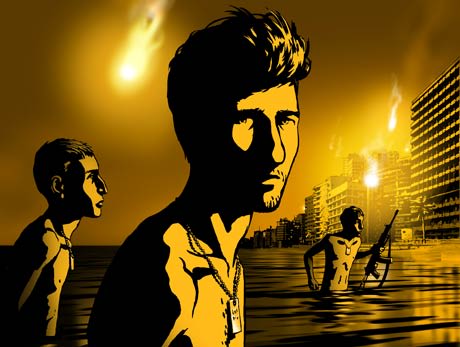Waltz With Bashir is an astonishing animated documentary that centres on a civilian massacre during the 1982 Lebanese-Israeli war. The film falls into two sections, starting with director Ari Folman hearing a friends recurring nightmare of 26 bloodthirsty dogs chasing him.
A former soldier, Folman cant remember anything about the war and so embarks on an investigation to escape his mental block. He interviews former comrades who served in the Israeli army when it invaded Lebanon in June 1982. One soldier was the sole survivor of his regiment after a beach attack but suffered guilt all his life. Another recalls a little boy attacking his squad with a rocket launcher. Others remember invading towns and blasting the hell out of anything in their sights, innocent or not. The message is clear: war is cruel.
The film turns when key Israeli ally and leader of the Lebanese Phalangist Christian militia, Bashir Gemayel is murdered. Secretly, the Israeli government ordered its forces to push as far as the capital, Beirut, in order to appoint Gemayel President of Lebanon. Out of revenge, Phalangist forces swarmed refugee camps to kill Palestinian soldiers, suspected of killing their leader. Instead, the Phalangists, with the tacit approval of the Israeli Minister of Defence and his army, slaughtered 3,000 innocent Palestinian men, women and children.
Hailed at Cannes this spring, Ari Folmans film synthesizes the documentary and animated form into a truly unique vision. The rotoscopic-like animation is realistic yet fluid, allowing Folman to leap from one memory to the next. The violence is bloody and unsentimental, reinforcing the true-life stories of Folmans haunted comrades.
Though told from an Israeli point of view, Waltz With Bashir pulls no punches in assigning blame to Folmans own army, as well as the Lebanese Christians. A weakness comes in explaining the complicated Philangist political situation to set up the massacre but that is a minor complaint.
Waltz With Bashir is a powerful film about the failure of war.
(Maximum)A former soldier, Folman cant remember anything about the war and so embarks on an investigation to escape his mental block. He interviews former comrades who served in the Israeli army when it invaded Lebanon in June 1982. One soldier was the sole survivor of his regiment after a beach attack but suffered guilt all his life. Another recalls a little boy attacking his squad with a rocket launcher. Others remember invading towns and blasting the hell out of anything in their sights, innocent or not. The message is clear: war is cruel.
The film turns when key Israeli ally and leader of the Lebanese Phalangist Christian militia, Bashir Gemayel is murdered. Secretly, the Israeli government ordered its forces to push as far as the capital, Beirut, in order to appoint Gemayel President of Lebanon. Out of revenge, Phalangist forces swarmed refugee camps to kill Palestinian soldiers, suspected of killing their leader. Instead, the Phalangists, with the tacit approval of the Israeli Minister of Defence and his army, slaughtered 3,000 innocent Palestinian men, women and children.
Hailed at Cannes this spring, Ari Folmans film synthesizes the documentary and animated form into a truly unique vision. The rotoscopic-like animation is realistic yet fluid, allowing Folman to leap from one memory to the next. The violence is bloody and unsentimental, reinforcing the true-life stories of Folmans haunted comrades.
Though told from an Israeli point of view, Waltz With Bashir pulls no punches in assigning blame to Folmans own army, as well as the Lebanese Christians. A weakness comes in explaining the complicated Philangist political situation to set up the massacre but that is a minor complaint.
Waltz With Bashir is a powerful film about the failure of war.
